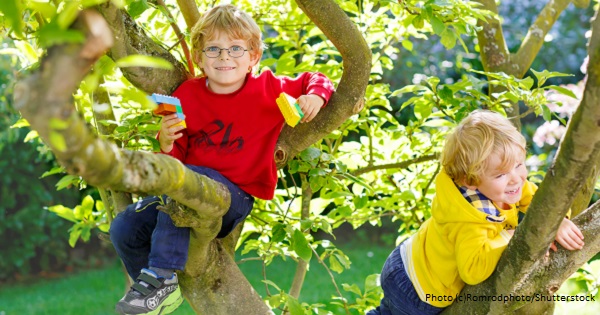 |
Some types of more dangerous risks can be allowed with us close by to catch them if they fall, while still allowing them to sense the danger, and therefore learn valuable lessons for themselves. Children do not learn to manage risks effectively when they are constantly shielded or cautioned away from them, nor do they learn from our words alone. How we give our children the freedom to manage risks is a personal choice and very much on a case-by-case basis. However, if you need a clearer picture of what this may look or feel like, I usually think of it as allowing them to do something on their own that is one step out of my comfort zone, with minimal injury at stake. If the risk is two steps out of my comfort zone, with moderate injury at stake; I would let a child navigate the risk with me right there to catch them, and possibly give information such as, “Those stairs are slippery with your socks on.” I am not talking about neglect or not properly childproofing your home! It’s about making choices in the moment to give experience with navigating progressively more advanced everyday risks. Fragile materials such as child-size glass cups can be used with children from a young age, after a few times experiencing that they break – and that it isn’t a big deal when they do – will give a child valuable real-life experience as well as the confidence, feeling of autonomy, and positive outlook to be resilient. 3 Reacting negatively to spills, drops, and breaks is not supportive of autonomy and risk-taking, nor of resilience. These are natural parts of a child’s learning process and can be seen as opportunities for parents to model staying calm and proactive during unwanted circumstances. Simply cleaning up the mess with a positive attitude sets a great example for children to follow; what we do becomes a part of them! Supporting Perseverance and Problem Solving “It’s not that I am that smart, it’s just that I stay with problems longer.” This famous quote by Albert Einstein exemplifies one of the key benefits of resilience; that persistence or the ability to stay with problems – rather than run away from or avoid them – can make all the difference in the world. In supporting perseverance and problem solving, it is as important for children to experience and be comfortable with success as it is for them to experience and be comfortable with failure.1 One way to support both perseverance and the development of problem solving skills is through the right materials. Open-ended simple toys and creative materials that allow a child to set and meet their own goals are wonderful to help children feel successful. 3 4 The creative and imaginative activities which are engaged in through use of these open-ended materials are especially important as children build the deep neural framework necessary for later critical thinking and problem solving skills. Logical games and toys that children need to figure out how to manipulate successfully are good as well. Ones that children can succeed at with various effort levels, so they can experience a wide range of feelings during play, are also helpful.
Screens and toys with lights and sounds can stimulate the amygdala 4 and get children locked into less-evolved parts of the brain; decreasing problem solving abilities. This is especially true for young children, after around ten years old the effects of this seem especially reduced because of a major synaptic pruning process. 4 We can also support children’s problem solving skills and persistence through the right communication style.5 If a child comes to us with an issue, it is often more beneficial and empowering for us to use questioning to support them in thinking the issue through and coming up with their own solutions than to give them the answer right away. 5 6 We, of course, need to take their language and reasoning abilities into account when using questioning, make sure the child is in a receptive state, and be mindful of our tone and body language. We help reactive or upset children move into a receptive state by connecting, acknowledging their feelings, and allowing them to move completely through their emotional expression first 6 (as explained in “Supporting Children’s Emotional Intelligence for Resilience”). Empowering Through Pain As hard as it is for many of us to accept, the most empowering thing we can do during a routine childhood bump or fall, is as little as possible. Allowing them to move through their pain, and get back up on their own two feet on their own, teaches children that we trust that they are capable of handling pain and setbacks. Just sitting near them calmly or placing a hand on their back can be enough to show support yet empowering trust to a child who needs help transitioning to a more autonomous, empowered state. It is not helpful, however, to tell them that they are “fine” or “OK” as this denies their internal experience and can cause them to begin to deny or avoid the feeling of pain rather than become truly strong in the face of it. 6 Validating that they have fallen, and allowing them to decide to get up and determine when they are feeling OK again for themselves is an empowering parenting practice when our children get hurt. Of course children, need the security of knowing we are there for them should they need us, but they also need our trust in their own strength and resiliency to really embody it. Every situation is different, and we need to decide for ourselves just how much help our children really need when they get hurt. Grading, Praise, and Rewards Colleges are reporting that children are so unable to deal with failure nowadays, and so likely to be thrown into a mental health crisis as a result, that professors are struggling with how to grade and give constructive criticism. 1 A parent at a discussion group on resilience – a college professor – recently expressed her severe concern about this issue that she sees first hand, as well as the issue of children simply not caring to put energy into their work and manipulating others into doing it for them. Both of these issues – and more – are shown to be directly linked with the use of grading, praise, and rewards, especially when individuals are younger. 7 Grading, especially in the pre-adolescent years, is linked with lower risk taking and less resilience later on. 7 Basically, a focus on grades early on can lead one to be less able to respond constructively to testing, grading, and other types of potentially negative feedback later on in life. This increased focus on meeting external demands, and a decreased focus on meeting one’s internal demands through free play and exploration in early childhood according to Peter Gray, Ph.D., 2 also may be linked with rising mental illness in children and adolescents, which is inherently disempowering.
Children’s ability to fail – and to glean the lessons and rewards therein – is inhibited when we focus on expectations and outcomes over meeting needs and participating in open-ended experiences, especially in the early years. 7 Educational practices that over-focus on getting the “right” answer, on grading, or on producing a certain product give children the message that they are only acceptable when they fulfill someone else’s predetermined expectation. Their esteem and direction becomes linked with outside forces. They are given the message that failure is bad and therefore must be avoided, when actually it must be accepted, explored, and even celebrated to achieve resilience and persistence. These practices also teach children to simply do the least amount of work possible to get the “goodie” – whether that be the “A”, the praise, or the tangible reward. 7 On the other hand, it seems that children who were not exposed to grading systems and testing in the earlier years of life approach grading and testing with a more constructive attitude later on, and are less likely to link feedback from grading and testing with their self-esteem. Instead, they are able to approach it as an opportunity to show what they know, and to receive feedback for growth, which is much more conducive to both learning, persistence, and resilience. The book Punished by Rewards 7 by Alfie Kohn reviews many scientific studies conducted over the last few decades which suggest that the use of praise and rewards, including grading systems; decreases children’s risk taking and creativity – and therefore their critical thinking and creative problem solving skills – as well as the internal motivation and confidence necessary to navigate tricky situations with resilience. Maria Montessori, founder of a popular child-rearing and education methodology and a huge supporter of child autonomy, independence, and resilience, also strongly warned parents and teachers away from the use of praise and rewards with children, so that they can remain autonomous, self-motivated, and resilient. Although this may not feel like second nature to many, there is much evidence and reasoning for this shift away from grading, rewarding, and using praise; which is valuable for any parent interested in supporting a resilient mindset in their children. As Welby Ings professor of Auckland University, says, “learning isn’t safe.” Our children need the internal state of resilience which is necessary to take risks in order to learn and grow into self-sufficient adults who can manage life’s uncertainties and struggles with confidence. By practicing the ideas outlined in this article, (as well as those in these other related articles “Empowering Children Towards Resiliency”, “Supporting Children’s Developmental Stages and Needs to Help them Achieve Resilience”, and “Supporting Children’s Emotional Intelligence for Resilience”) we will greatly support our children’s natural path towards embodying a mindset of resiliency. This may be new information and possibly an orientation of thinking about our children that we are not yet comfortable with. Taking the time to absorb and practice this type of support is so nurturing of our children’s development and of the resilience necessary to become self-actualized, independent adults. Interacting with our children in this way also leads to the type of attuned, kind, responsive, respectful, and fulfilling relationships we all want with our children. This is the last in a series of four articles on this topic by Jacqueline King-Presant, M.Ed., a child development specialist and consultant. The first article is Empowering Children Towards Resiliency; the second article is Resiliency is Natural: Supporting Children’s Developmental Stages and Needs Helps Them Achieve Resilience; the third article is Supporting Children's Emotional Intelligence for Resilience. Visit the author's website www.brightnewdaychildren.com for more information or contact Jackie@brightnewdaychildren.com. Comments and questions are welcome. Footnotes 1 Gray, P., Ph.D. (2015). Declining Student Resilience: A serious problem for colleges. Psychology Today. 2 Gray, P., Ph.D (Spring 2011) The Decline of Play and Increase of Psychopathology in Children. American Journal of Play. 3 Lillard, P.P. & Jessen, L.L. (2003) Montessori From the Start: The child at home, from birth to age three. New York: Schocken 4 Payne, K.J., M.A. & Ross, L. (2010) Simplicity Parenting. New York: Ballantine Books 5 Brooks, R., Ph.D. & Goldstein, Ph.D. (2001). Raising Resilient Children. Chicago: Contemporary Books 6 Siegal, D., M.D. & Bryson, T.P., Ph.D. (2011) The Whole Brain Child. New York: Delacorte Press 7 Kohn, A. (1999). Punished by Rewards: The trouble with gold stars, incentive plans, A’s, praise, and other bribes. New York: Mariner Books. Resources and Further Information Six Steps to Building Kindness and Resilience with Dan Siegal (videos). The Dalai Lama Center for Peace and Education. http://dalailamacenter.org/learn/dan-siegel-6-steps-build-kindness-and-resilience-children Chopra, D., M.D. & Tanzi, R.E., Ph.D. (2012). Super Brain. New York: Harmony Books Goleman, D. (2005). Emotional Intelligence: Why it can matter more than IQ. New York: Bantam Books Gray, P., Ph.D. (2013). Free to Learn: Why unleashing the instinct to play will make our children happier, more self-reliant, and better students for life. New York: Basic Books. Disobedient Thought: Welby Ings at TedX Auckland (2013) (Video). https://www.youtube.com/watch?v=aumxbgOdkRU McLeod, S. (2013) Erick Erickson. Simple Psychology. http://www.simplypsychology.org/Erik-Erikson.html McLeod, S. (2016) Maslow’s Hierarchy of Needs. http://www.simplypsychology.org/maslow.html Siegal, D., Ph.D. & Bryson, T.P., Ph.D. (2016) No Drama Discipline. New York: Bantam Books Siegal, D., Ph.D. & Hartzell, M., M.Ed. (2003) Parenting From the Inside Out: How a deeper self-understanding can help you raise children who thrive. New York: TarcherPerigree
| |






